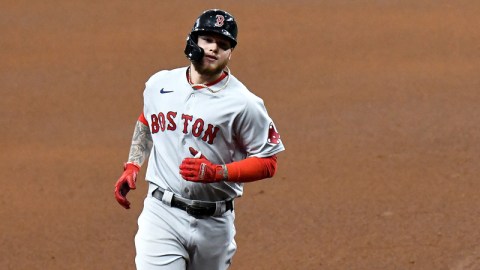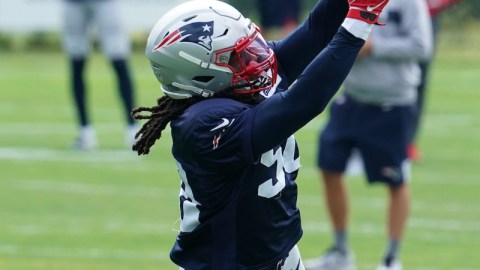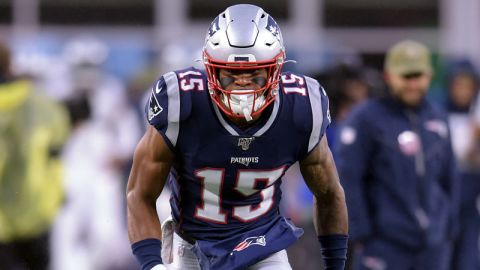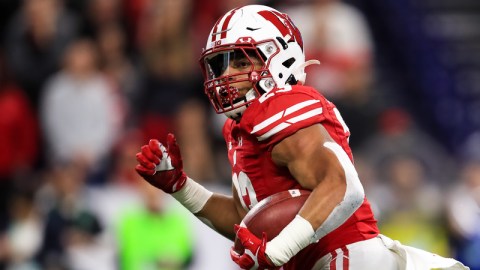The bad news for the Boston Red Sox: There aren’t a lot of so-called experts picking them to beat the Houston Astros in the American League Division Series.
The good news, however, is a lot of those same experts predicted the Red Sox to dispatch the Cleveland Indians in last year’s ALDS.
We all know how that went.
The Red Sox face a tall task this postseason, too, as the Astros were one of just big-league teams who eclipsed the 100-win mark in 2017. The series begins Thursday in Houston, but before Justin Verlander throws the first pitch, let’s breakd down how these two teams match up.
Click here for a full Red Sox-Astros schedule >>
STARTING PITCHING
Boston
The Red Sox are expected to go lefty-heavy against Houston, which owned Major League Baseball’s top offense in 2017. Chris Sale gets Game 1, of course, and he’s looking to put a rough 11-start stretch behind him: The southpaw allowed 30 runs over 66 innings in the season’s final two months, an undeniable sample size.
Boston’s Game 2 starter, Drew Pomeranz, also comes with question marks. His velocity dipped by about 2 or 3 mph in the final month, which has to be an area of concern. If he can’t operate in the mid-90s, it makes his bread-and-butter pitch, the curveball, less effective. If Pomeranz suddenly is sitting at 93 mph again, though, and his secondary stuff is on, he could be the Red Sox’s most important piece in this series.
As far as Game 3 goes, the Red Sox have yet to announce a starter. There doesn’t seem to be an obvious option, either, as the three apparent candidates — Doug Fister, Eduardo Rodriguez and Rick Porcello — all have their own flaws.
Houston
Justin Verlander never stopped being “good,” per se, but holy moly, has he been unbelievable since the Astros acquired him in August. The former MVP has been virtually unhittable, allowing just four runs in 34 innings, while winning all five of his starts and averaging 11.4 strikeouts per nine innings. Also — this will be a theme — Red Sox hitters have had minimal career success against Verlander, collectively hitting just .199 against him with 33 strikeouts. Tabbed as the Game 1 starter, Verlander could ultimately get two cracks at Boston in the series.
The Red Sox also have had little success against Houston’s Game 2 starter, Dallas Keuchel. Another former Cy Young Award winner, Keuchel battled injury and inconsistency in 2017 but finished strong, posting a 2.95 ERA over his final nine starts of the season. He’s especially comfortable at home, too, where his 2.94 career ERA at Minute Maid Park is nearly two runs better than his road mark. Red Sox hitters are also hitting just .212 (21-for-99) against him.
Houston also has yet to name a Game 3 starter, but it will either be Brad Peacock or Charlie Morton, who combined to go 27-9 this season. Peacock split time in the bullpen and rotation, while Morton worked primarily as a starter and has the longer track record of success.
Advantage: Astros
BULLPEN
Boston
Only three bullpens in baseball held opponents to a lower batting average against than the Red Sox. And that doesn’t even tell the whole story, as Boston’s bullpen looks markedly better with a full arsenal of arms, including Carson Smith (returned from injury), Addison Reed (trade deadline pickup) and David Price, who the Red Sox will use as a reliever in the postseason.
Price is the potential X-factor. He allowed just three hits in five relief appearances, striking out 13 of the 32 batters he faced. His bullpen work was a catalyst to the Tampa Bay Rays’ 2008 success, and he could serve a similar role with the Red Sox. Craig Kimbrel also might be the best closer remaining in the playoffs. The question in this series will be whether Boston’s bullpen can be so good that it overcomes deficiencies with the offense and starting pitching.
Houston
The Astros’ bullpen doomed them in the playoffs two seasons ago. It would be surprising to see the same thing happen this year. Houston’s retooled ‘pen doesn’t have a Kimbrel-like arm at the end, but there are plenty of solid options like Ken Giles, Chris Devenski and Luke Gregorson. How they use Devenski will be fascinating to watch. Twenty-four of his 62 appearances lasted more than one inning, but he only threw multiple innings five times in his last 22 games this season.
Advantage: Red Sox
OFFENSE
Boston
These aren’t your father’s Red Sox. Hell, these aren’t your Red Sox from, like … the last 10 years. It’s been a while since we’ve seen a Boston offense that strikes this little fear into opposing pitchers. The Red Sox offense isn’t necessarily bad, it’s just very average. In a year where home runs literally were hit at a record pace, only three teams — San Francisco, Pittsburgh and Atlanta — tallied fewer home runs than the Red Sox. And we’re just one year removed from watching Boston’s bats go absolutely silent against a great pitching team in the Indians.
The Red Sox might have to play a little small ball in this series. They finished sixth in baseball in steals and had the fourth-lowest strikeout rate of any team in baseball. They’re a lot like the Royals from 2015 — OK starting pitching, great bullpen and lots of contact.
Houston
The Astros had the best offense in baseball this season. They scored the most runs, hit the second-most home runs, had the highest batting average and led the majors in on-base percentage. There isn’t an easy out in the lineup, starting with Jose Altuve, who might be the best pure hitter in the sport. Houston had four hitters slug at least 23 home runs, led by George Springer who hit 34. There’s just so much balance from to bottom.
Advanced scouting — and executing the scouting report — is more important than ever for the Red Sox if they’re going to find any sort of trends or holes in the Houston lineup. Good luck with that, though.
Advantage: Houston
PREDICTION
Astros in 5
If Chris Sale doesn’t pitch well in Game 1, this could be a very quick series. We’ll say he pitches up to his potential and helps Boston win Game 1, then comes back to pitch Game 4 on short rest and wins that, too. But elsewhere, the matchups just favor Houston too much. Cleveland got all the attention for its ridiculous winning streak in August and September, but even with those 22 straight wins, the Tribe only finished one game better than Houston. The Astros were one of the best teams in baseball all season, and they’ll be just a bit too much for the Red Sox to handle.
Thumbnail photo via Bob DeChiara/USA TODAY Sports Images




